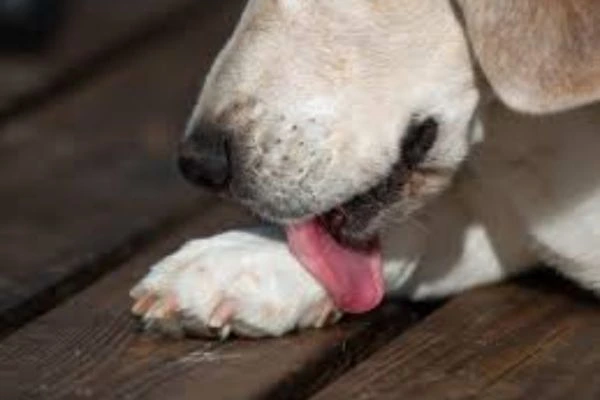Licking paws is a common thing among dogs and cats.
While it isn’t a reason for concern, it is always better to take a closer look at things.
Maybe they are licking their paws anxiously or with aggression, hinting that something is bothering them.
As parents, it is our responsibility to notice the subtle signs of help.
Thus, in this article, we discuss all the possible reasons why your dog licks its paws.
Why do Dogs Lick Paws? (Explained)
1. Allergies – The Most Common Cause
One of the leading causes of paw licking is allergies. Dogs can be allergic to pollen, grass, mold, dust mites, food ingredients, or even cleaning products used in the home.
When a dog is exposed to an allergen, it often manifests through itchy, inflamed skin — especially on the paws. Licking becomes their way of soothing the irritation.
If allergies are the culprit, you may also notice red skin, chewing between toes, or constant scratching in other areas.
2. Injury or Pain
Dogs often lick a specific paw when they have a cut, thorn, blister, or sore spot. It’s their instinctive way of cleaning and caring for a wound. This can also include insect stings, hot pavement burns, or overgrown nails causing pressure.
Even internal injuries like joint pain or sprains may cause a dog to lick persistently. If your dog focuses on one paw, check for swelling, tenderness, or signs of limping.
See Also:
3. Parasites or Skin Infections
Fleas, ticks, mites, or fungal infections like yeast can cause intense itchiness in dogs — especially around their feet. These irritants make paws feel uncomfortable, leading to repeated licking or chewing.
Over time, excessive licking can damage the skin and create secondary bacterial infections. You might notice redness, foul odors, or discharge between the toes, which signal a skin problem that needs medical treatment.
4. Boredom or Anxiety
Just like humans bite nails or twirl hair when anxious, dogs may lick their paws out of stress or boredom. If your dog is left alone for long periods or lacks physical and mental stimulation, licking can become a self-soothing behavior.
In anxious dogs, it’s often repetitive and focused — like a compulsion. Over time, this habit can become ingrained, even if the original trigger (boredom or stress) is no longer present.
5. Environmental Irritants
Dogs’ paws are constantly exposed to the ground — which may include chemicals, road salts, pesticides, or household cleaning agents. These substances can irritate sensitive paw pads and cause inflammation or dryness.
Dogs may respond by licking to clean or soothe their feet. It’s especially common during winter (road salt) or spring (lawn fertilizers). If you notice licking after walks, rinse your dog’s paws to remove residues.
6. Grooming or Habitual Behavior
Some dogs lick their paws simply as a part of routine grooming. It’s natural for them to clean dirt, debris, or food particles off their feet. However, when grooming turns into constant licking with no clear trigger, it can become a habitual or compulsive behavior.
This may be reinforced by attention from the owner or because it releases feel-good endorphins in the brain, making the dog feel calm.
🛑 How to Reduce Paw Licking
If your dog is licking its paws frequently, here are some steps to reduce or prevent the behavior:
-
Inspect the paws regularly for cuts, swelling, or foreign objects.
-
Clean their paws after outdoor walks to remove allergens or chemicals.
-
Switch to hypoallergenic food if food allergies are suspected.
-
Use vet-approved anti-itch sprays or paw balms to soothe irritation.
-
Provide more exercise and mental stimulation to reduce anxiety and boredom.
-
Distract with toys or chews when your dog starts licking excessively.
-
Avoid reinforcing the habit — stay calm and redirect gently rather than scolding.
Consistency is key. If the behavior continues, it may need more than just home care.
🐶 When to Consult the Vet
Sometimes paw licking is a sign of a deeper medical or behavioral issue. Contact your veterinarian if:
-
The licking is constant or obsessive
-
Your dog is licking only one paw repeatedly
-
You notice swelling, redness, discharge, or odor
-
There are signs of pain, limping, or fever
-
The skin is raw, bleeding, or has bald patches
-
Your dog shows signs of anxiety, stress, or behavioral change
A vet can perform tests to diagnose allergies, infections, parasites, or injuries — and provide treatments like antibiotics, antihistamines, medicated shampoos, or anxiety medication if needed.
Dogs cannot talk, of course.
But they are quite adept at communicating their mind.
We just have to be mindful of the signs.

Nikita Rout is a passionate content writer at HowItSee.com, where she explores the wonders of animals, nature, and the curious questions that spark our imagination. With a love for research and a knack for simplifying complex topics, she brings clarity and creativity to every article she writes. When she’s not writing, you’ll likely find her reading about animal behavior or coming up with unique pet name ideas.

